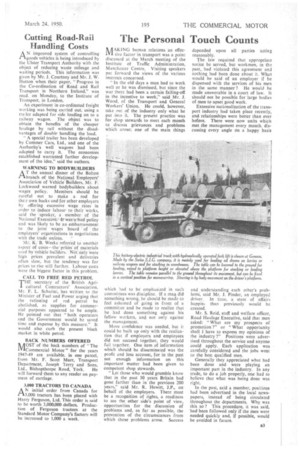The Personal Touch Counts
Page 37

If you've noticed an error in this article please click here to report it so we can fix it.
NAAKING human relations an effecIvi tive factor in transport was a point discussed at the March meeting of the Institute of Traffic Administration, Manchester Centre. Visiting speakers put forward the views of the various interests concerned.
"in the old days a man had to work well or he was dismissed, but since the war there had been a certain falling-off in the incentive to work," said Mr. J. Wood. of the Transport and General Workers' Union. He could, however, take out of the industry only what he put into it. The present practice was for shop stewards to meet each month to discuss grievances and problema which arose; one of the main things
which had to be emphasized in such committees was discipline. If a mat) did something wrong, he should be made to feel ashamed of going in front of a committee and be made to realize that he had done something against his fellow workers, and not only against the management.
More confidence was needed, but it could be built up only with the realization that if employers and employees did not succeed together, they would fail together. One item of information which should be disseminated was the profit and loss account, for in the past not enough information on this important matter had been given to competent shop stewards.
"Let those who would grumble know that in the past 30 years Britain had gone farther than in the previous 200 years," said Mr. R. Hewitt, LP., on behalf of the employers. There must be a recognition of rights, a readiness to see the other side's point of view, opportunities for the discussion of problems and, as far as possible. the prevention of the circumstances from which those problems arose. Success depended upon all parties acting reasonably.
The law required that appropriate notice be served, but workmen, in the past, had violated this agreement and nothing had been done about it. What would be said of an employer if be dispensed with the services of his men in the same manner? He would be made answerable in a court of law. It should not be possible for large bodies of men to upset good work.
Extensive nationalization of the transport industry had taken place recently, and relationships were better than ever before. There were now units which met the management every month. discussing every angle On a happy basis and understanding each other's problems, said Mr. I. Pinder, an employed driver. In time, a state of affairs happiel than previously would be created.
Mr. S. Reid, staff and welfare officer, Road Haulage Executive, said that men asked: "What are my prospects of promotion?" or "What opportunity shall I have to express my opinions of the industry ?" Positions were advertised throughout the service and anyone could apply. Each application was carefully considered and the jobs went to the best qualified men.
Generally they appreciated what had been done and were playing an important part in the industry. In any trade, to do a job properly, one had to believe that what was being done was right.
In the past, said a member, positions had been advertised in the local newspapers, instead of being circulated throughout the departments.. Why, was this so? This procedure, it was said, 'had been followed only if the men were needed quickly and, if possible, would be avoided in future.




























































































